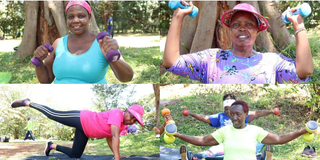
Despite being in their 60s and 70s, this group of retirees have taken the adage, ageing like fine wine, to the next level.
Despite being in their 60s and 70s, this group of retirees have taken the adage, ageing like fine wine, to the next level.
They not only look younger, they are gyrating to Kool & The Gang hits like they did in their youthful days, just less vigorously.
This team of female retirees go to Nairobi’s Karura Forest each day to dance, some with dumbbells, to beat retirement boredom and slow down old age ailments.
Among them is Agnes Maganjo, a 61-year-old.
“Coming here to the dance gives me many benefits. First, my health is back. I was a big woman, probably 83kg when I joined the dance club two years ago, but now, I am 60kg and I want to maintain. My weight had dropped to 58kg but I felt I was too small,” says the land economist, who also has a Master’s degree in Project Management.
Before she made dancing a priority, dedicating two hours to it each day, Agnes was running a project management and development firm.
Then sickness crept in, slowing down her working life. She underwent two brain tumour surgeries in India.
“When I was told that I had cancer, a part of me died at that moment. I buried myself in my thoughts. I saw people crying at my funeral, but now that I’m alive, every dance move is a celebration of my life,” she says.
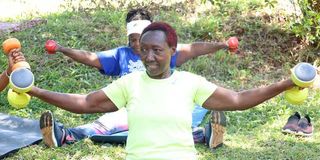
Agnes Maganjo, a retiree, during a workout session at Karura Garden in Nairobi on March 14, 2025. The session highlights the importance of physical fitness and active living in retirement.
For the mother of three, this dancing club means more than fitness to her. It has given her new hope.
Before being diagnosed with stage two brain tumour, Agnes recalls struggling with frequent headaches, forgetfulness, irritation, and change of personality. These signs worried her but she chose not to seek treatment.
“My children were very young then. I started growing my organic farm and I would eat natural food that I have grown without fertiliser. I started to feel better. I was gaining my strength; my memory came back and I went back to work,” she says.
However, she later got a stroke on her left side.
“Suddenly, I couldn’t walk. When I went to the hospital, they said the tumour had uprooted itself from the brain and that it was lying on the motion nerves. I had never heard anything like that in my life,” Agnes, who is also an avid reader, says.
Left with no choice, she had to have surgery as the doctors warned her that delaying the operation would lead to the tumour regrowing its roots back into the brain and it would be more aggressive.
The surgery went well, however, she made “a small mistake.”
“I had been told to do the chemotherapy follow-ups but I did not. I was too happy; I didn’t want to hear about cancer any more. In 2022, something happened again. I lost my memory this time. The first time it was my motion; this time it was my memory. I could not figure out anything. Talking was a problem and it was so sudden,” she tells Lifestyle.
Together with her family, Agnes says that they started seeking medical help and went back to India although to a different doctor for a second surgery. The tumor had regrown and diagnosis showed that it was at stage 4.
“That was so devastating. When you are sick, making decisions is a life and death kind of thing. After undergoing the two surgeries, I have now put myself in God’s hands,” she says.
Returning home with a lot of optimism, Agnes started looking for something else to do that would help her appreciate being physically active. It is then that she learned of a dancing club through a friend. She joined, only six months after the brain surgery, and has since been dancing every single day.
“I retired from work into dancing. This is what I do, two hours a day. Although I do consultancy in economics and development because we run a consulting firm as a family, where I work in the morning for two hours,” she says.

Paul Mwaura, a fitness trainer (center), with some of his clients during a workout session at Karura Forest in Nairobi on March 14, 2025.
Also in the dance club is Cecilia Maingi, a 65-year-old. Motherhood and her career took up her life, making it hard to participate in social groups. However, now that she is a retiree, she says that she has more time that she is investing in her wellness.
“I did not put on lots of weight easily, but after I turned 60, it started settling. I eat the same food, and of course, I have even purposely reduced the ratios, but still, I am adding weight and that is why I am exercising. Sometimes I can get lazy and don’t come for a month, but I return because of the need,” she says.
Cecilia, just like Agnes, was a career woman. She had a stable job in her early 30s, but took an early retirement.
“When I left permanent employment, I was 35 years old. I was working at the same organisation with my husband and we got our four children very fast, such that when I was 32, I was already a mother of four,” she tells Lifestyle.
Now that all her children are grown-ups and left the nest, she says her home has become lonely. She lives with her husband of 42 years.
“I have one grandchild who is eight years old, and I had an opportunity to stay with her, but then they relocated abroad and I become lonelier,” she says.
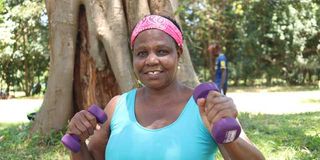
Cecilia Maingi, a retiree, during a workout session at Karura Garden in Nairobi on March 14, 2025.
Apart from struggling to fill her days, which the dancing has helped with, old age has also come with body changes such as aching joints. She also struggles to sleep.
“My sleeping pattern has changed. I discipline myself to make sure that I am asleep by 11pm latest, but it is not easy because when I feel like reading or watching something, I can go late into the night and then the following day, I tend to sleep even up to 10am, Cecilia says of her retirement life pattern changes.
Back to school
Despite being in her sunset years, she says, there are things she did not do in her youth but is now looking to do.
Growing up in Meru, Cecilia wanted to get a university education but missed the entry points. Instead, she pursued a diploma course before motherhood knocked on her door.
Now, with free time, she is excited to be studying her first degree in Theology at a university in Dallas, US, with a campus in Nairobi.
“It feels very exciting to join university. My in-person classes begin at 9am and go through to 4pm, but I only go to class on Tuesdays,” she says.
We also meet Margaret Mwaura, another dancer. She does her workout under an umbrella tree after a whole hour of dancing. The retired teacher, an environmental champion, cherishes the beautiful trees. The mother of five admits that with her children out of the nest, the house gets lonely. She also notes that quality sleep has become an old-age struggle for her and her husband.
“We now sleep for very few hours because we are no longer as active as we used to. I normally go to sleep at around 10pm or 11pm, and by 2am, I am mostly sleepless,” she says.
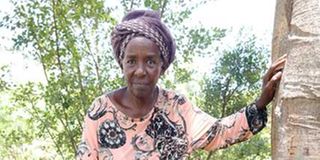
Margaret Mwaura, a retiree, engages in a workout session in Nairobi on March 14, 2025.
However, when sleep becomes elusive, she writes.
Margaret is currently writing her biography.
“I get back to bed at 5am then wake up at 8am before I go for our morning walk with my husband for about an hour,” she says.
One other thing that she struggles with is forgetfulness.
“I’d hold my phone in my hand but I’ll look for it all over the house. Sometimes I ask my husband to call me so that I can locate it, only to realise that I have it in my hand or handbag,” Margaret says.
She describes belonging to a dance club as a worthy investment for both her and her husband and that they will continue dancing for as long as possible.
“Dancing is very important for our physical health because we do exercises that enhance our balance, and being in a club where we are all old offers us room to make mistakes without critics,” she says.
Her love for the environment continues to keep her busy as she plants trees and engages children in various environmental artworks through the organisation that she founded after she retired.
For Naomi Ngugi, 65, a retired nurse, dancing is her passion and she does it twice a week for fun. Having been in a busy discipline for almost 45 years, looking back she gets satisfaction in the lives she changed.
“My work schedule was very rewarding. I helped people physically and emotionally, and at the end of the day, I felt satisfaction when I saw somebody come in pain or discomfort and then go home smiling because of the care they received from me,” Naomi says.
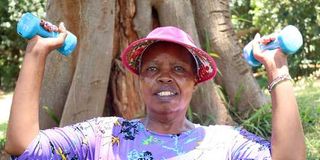
Naomi Ngugi, a retiree, during a workout session at Karura Garden in Nairobi on March 14, 2025.
Just after retiring, she joined a friend who is a caregiver in the community home where she is still offering her expertise. However, she now works fewer hours. Having many things in her to-do list keeps loneliness at bay.
“I knew I was going to retire one day, but you retire at a time when you feel you have a lot to offer more than ever before because you are experienced, you have been active and you cannot just stay doing nothing,” she says.
Naomi enjoys travelling, and if it were not expensive, she would do it more frequently. Today as she dances to music, every word takes her to places she loves while every move she makes is exercise that makes her more flexible.
“It is fun meeting new people and learning other people’s culture. I love social life because I meet new friends,” she comments.
Fortunately for her, her children, now all adults, live near her home. This means that she sees them quite often, and with many free hours, she also picks her grandchildren occasionally from school when their parents are busy, something that makes her retirement life more fun.
“When my children were still living with me, I was more comfortable because I knew what they were doing. Now I worry about their careers, their spouses and my grandchildren as well,” Naomi says of the motherhood responsibilities that transcend retirement.
When a majority of Kenyans retire, they move back to the village. We ask her if she has ever considered retiring in the village.
“I am a city girl whose home is in Nairobi. I have fruit trees and a kitchen garden in my compound and all that is what people have in the village. I also have all my friends here in the city, so I return to the village just to visit my parents and other relatives, then return,” says the mother of four.
Paul Mwaura is the senior citizen fitness dance coach. He points out that retirees have a lot of free time, and that since they are no longer actively working to earn an income, they lead a sedentary lifestyle.
“We give them a lot of coordinating exercises just to help them rejuvenate their minds and then we also do strength training. Remember, as they age, their muscles are weakening and their joints are the ones that now hold the body, so, they develop a lot of joint pains and weakening of muscles,” Paul explains.
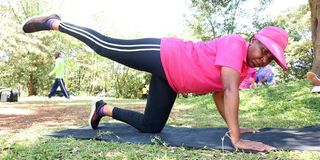
Lucy Njoroge, a retiree, during a workout session at Karura Garden in Nairobi on March 14, 2025.
Besides taking them through exercises such as body twists, they also lift weights, but not so heavy. He also organises cycling, saying that simple exercises such as kneeling down and moving legs straight, up and down, help his clients to strengthen their muscles and ease joint pain.
“Coordination helps to engage body movements, hands, and legs moving at the same time. That coordination is also more of a mind game and it helps in fighting forgetfulness,” Paul says, adding that the group has senior citizens in Nairobi and Kiambu counties who have joined dancing clubs.
For example, Tropical Fitness has over 300 retirees who go for the exercises and dancing, which they enjoy in an outdoor setting like Karura Forest.
“We exercise inside the forests because of what we call phat on site, a chemical compound that is produced by these trees to heal themselves. We borrowed the idea from Japan where patients do something they are calling forest bathing,” says Paul.









